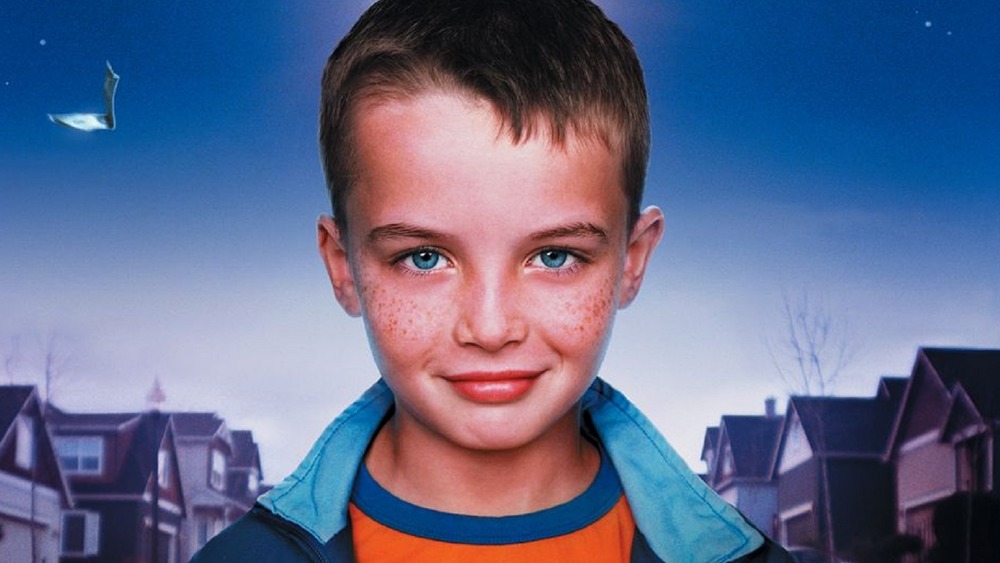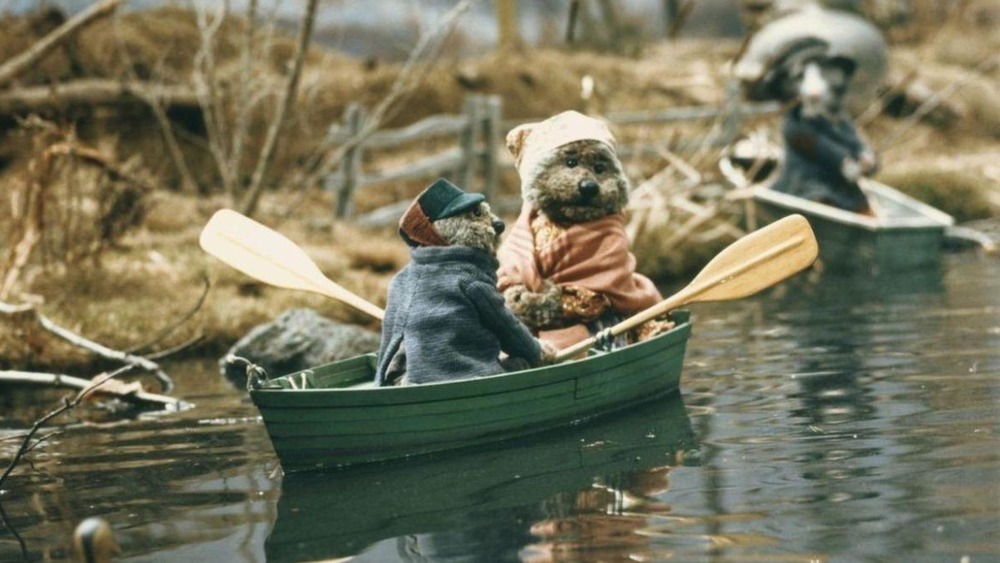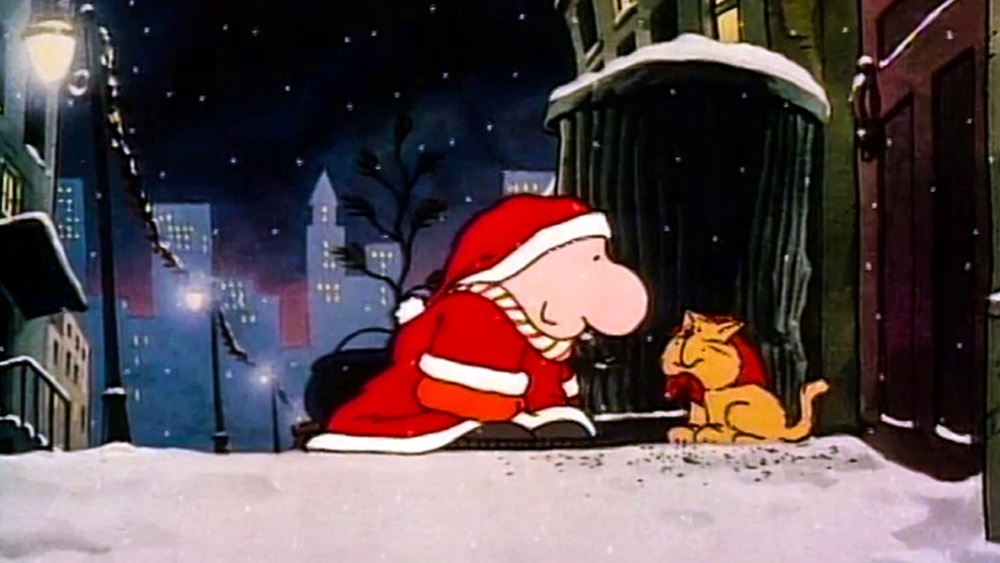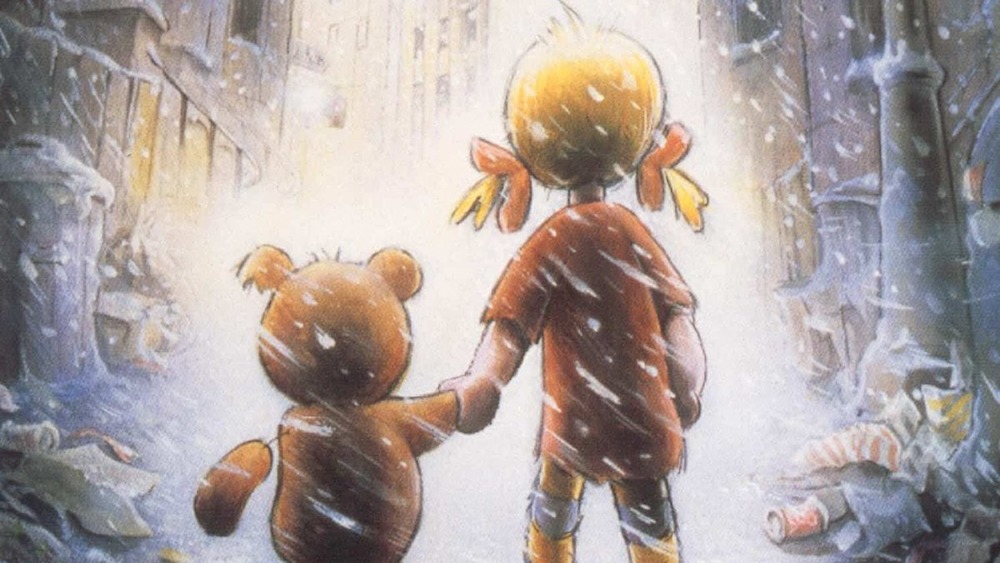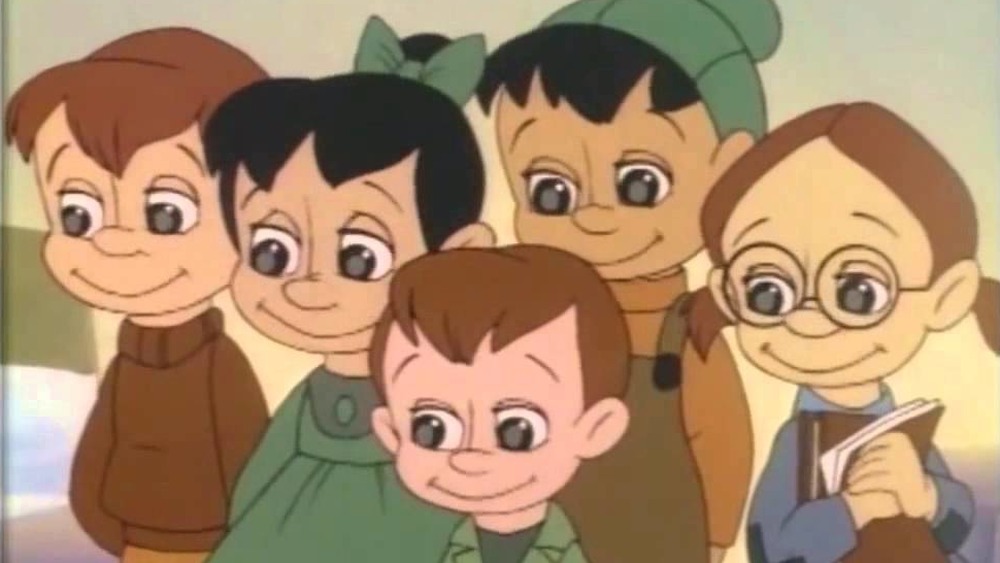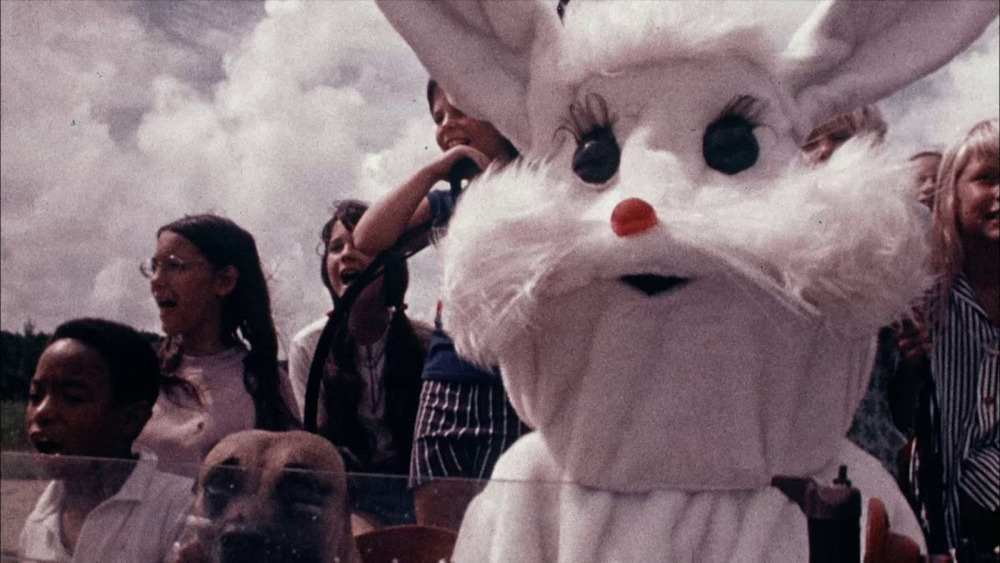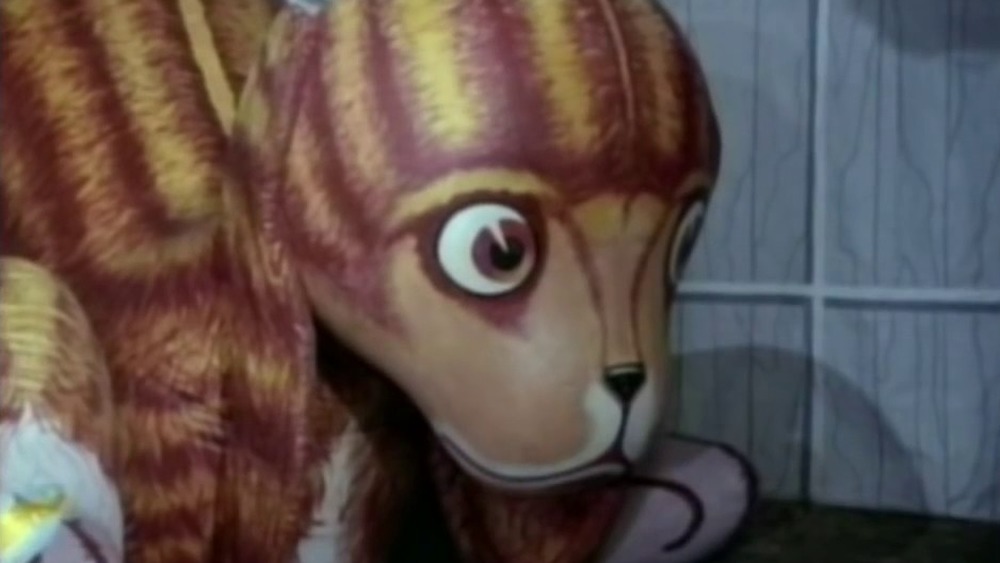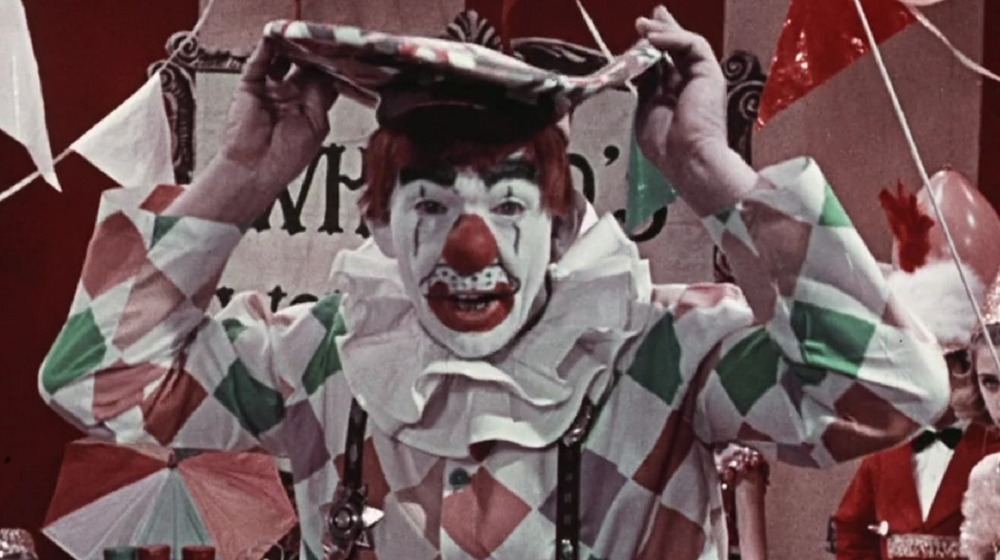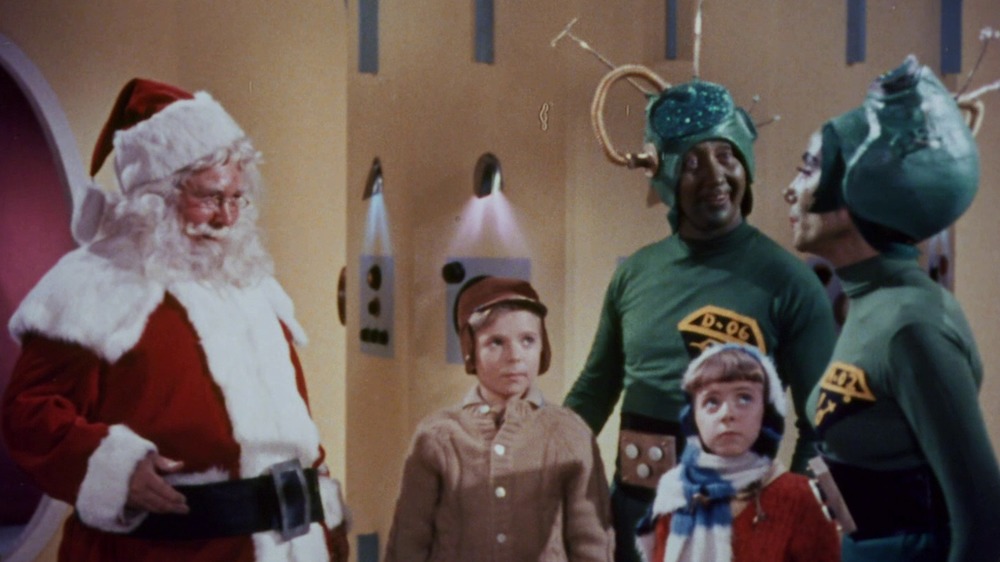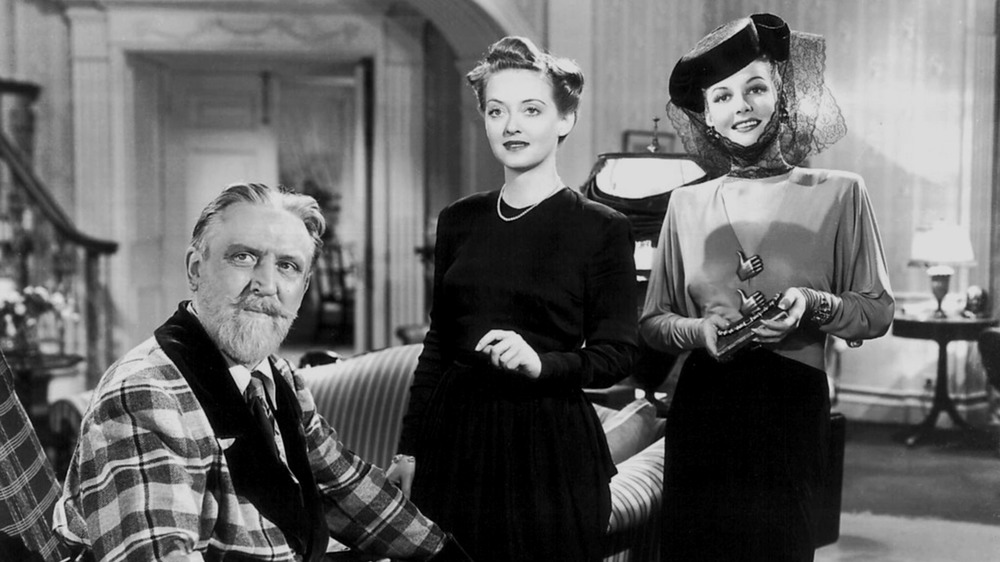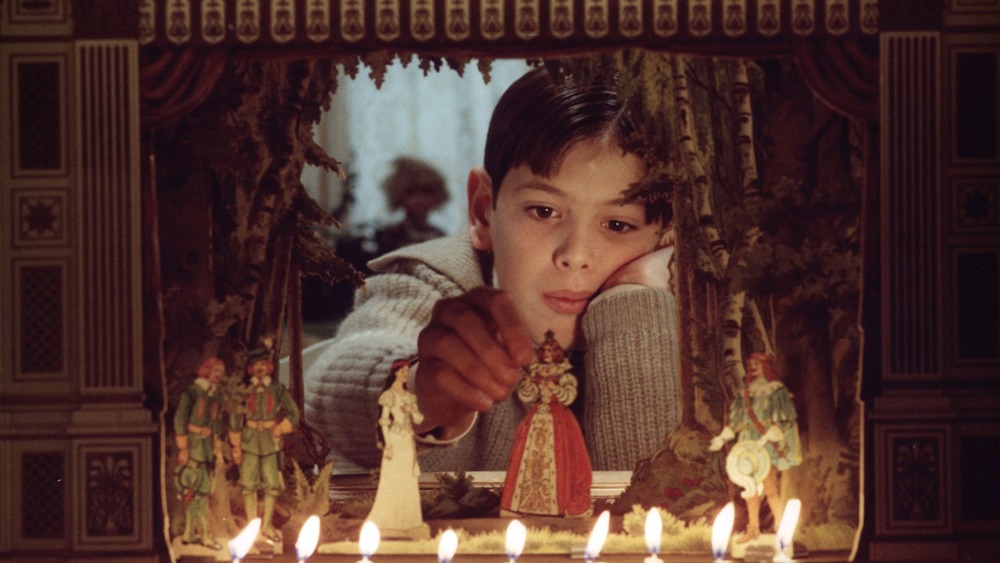Must-Watch Holiday Movies And Specials You Forgot About
During the holiday season, we all have our own viewing traditions. Perhaps you always watch How the Grinch Stole Christmas!, It's a Wonderful Life, or any of the hundreds of adaptations of A Christmas Carol. If you're a little younger, maybe you grew up on Elf, or if you're into something with more action, you could be on the "Die Hard is really a Christmas movie" train. Or perhaps you have your own, more idiosyncratic holiday viewing traditions.
After all, year in and year out, every studio in the Christmas-celebrating world pumps out new holiday films in the hopes that they might join the ranks of the classics and generate the steady revenue that comes from being shown again and again every December. Every once in a while, one of them succeeds. But there are always many more failures, some unjust and others so spectacular that you just have to see them for yourself. Here are a few of them for your holiday pleasure.
Emmet Otter's Jug Band Christmas is a Muppet masterpiece
By the end of the '70s, Jim Henson was on top of the world with the success of Sesame Street and The Muppet Show, but that wasn't enough. He was always looking for new ways to expand the possibilities of puppetry as a medium, and Emmet Otter's Jug Band Christmas is just one way he did that. This 1977 special anticipates the ambitious technical trickery of later projects like Labyrinth and The Muppet Movie, besides just being a great story in its own right. In it, Emmett and his ma are struggling to get by on the revenue from their laundry business, so they decide to risk it all on the Christmas talent contest.
The animal characters are more realistic than anything the Muppets had done before, and they exist in a whole world of exquisitely detailed Muppet-sized sets. Henson finds creative ways to hide the human performers so the puppets can do impossible things like rowing a boat or driving a car. And it features a collection of achingly beautiful songs by Paul Williams, who'd go on to write "The Rainbow Connection" and the rest of the score for The Muppet Movie. One song in particular, "When the River Meets the Sea," is so powerful that Henson asked for it to be played at his funeral.
Ziggy's Gift is a marvel of animation
Before he reinvented and revitalized the animation medium with Who Framed Roger Rabbit, Richard Williams and his studio took whatever contracts came their way, from commercials to movie credits sequences to holiday specials like this one. But no matter what assignment they got, they took them all seriously, filling each one with the same dizzying detail they brought to Roger, Jessica, and company.
In 1982, they adapted the popular newspaper comic Ziggy, whose creator no doubt hoped he'd have the same success Charles M. Schulz did with A Charlie Brown Christmas. It didn't succeed, but this warmhearted story — where Ziggy discovers a magical cauldron that produces whatever gifts people need after volunteering as a street corner Santa Claus for what turns out to be a scam — still deserves a wider audience.
While most animation keeps action to a bare minimum to save money, every frame of Ziggy's Gift is full of movement, from the wiggling little strands of toothpaste that spill out of Ziggy's puncture-filled tube to the snow he kicks up in his path. Williams effortlessly moves Ziggy's two-dimensional characters in three-dimensional space, the details of their motion all the more clear and fluid because of the simplicity of their designs. And Ziggy's Gift brings the laughs, too, especially in the slapstick misadventures of the hapless pickpocket who tries to get his hands on Ziggy's cauldron.
The Forgotten Toys: The Night After Christmas is a beautifully melancholy fable
Christmas is a joyous occasion, but too much happiness can be exhausting, and the bleakness of the winter lends itself well to stories with a more melancholy mood. Few specials hit this note as well as The Forgotten Toys: The Night After Christmas. Based on the book by James Stevenson, it follows two toys, Teddy and Annie, who find themselves in the garbage after their owners get newer, shinier toys for Christmas.
Instead of the cartoony voices you might expect, they're played by British character actors Bob Hoskins and Joanna Lumley. They don't phone it in, either, and their performances go a long way. When so much kids' entertainment is based on adults embarrassing themselves just to get a laugh from the little ones, there's something both refreshing and charming about the quiet dignity these two bring to the table. Besides, the incongruity of Hoskins' Cockney, tough guy voice coming out of a teddy bear is funny enough on its own (and maybe a sly joke about the childishness of the gangster characters he normally plays?).
That gives the special room for the drama to develop, especially in one beautiful and moving musical montage that anticipates the "When She Loved Me" sequence in Toy Story 2 and somehow isn't hurt at all by that comparison.
Creature Comforts: Merry Christmas, Everybody! is full of holiday hilarity
Based on Nick Park's Oscar-winning short, the British TV series Creature Comforts took anonymous interviews (with, as the credits call them, "the great British public") and put them in the mouths of a whole zoo's worth of animated animals. The Christmas special is especially wonderful, gathering an array of opinions on the holidays, loosely tied together with attempts to sing and analyze the lyrics to "The 12 Days of Christmas." It's so packed with little background details that it's ideal for annual viewings and re-viewings. One scene shows a puppy stuck in the paper crown from a Christmas cracker. The next time we see him, the crown's been torn to shreds.
Some of the interviews are heartwarming, like the French hen who tells us, "The spirit of Christmas is something really beautiful — when you believe in it." Others are hilariously, bleakly honest, like the fox who says Christmas gives him an opportunity to get away from his troubles and focus on new ones, like dealing with his family, with the world's most joyless laugh.
The Christmas Tree raises shoddiness to an art form
Some of these movies are essential viewing because they're beautifully crafted. Others demand your time because they're so wonderfully terrible. Not much lives up to that description quite like The Christmas Tree. Deficient in animation, acting, and common sense, it's an overlooked classic for all the wrong reasons. It takes place in an orphanage run by the hilariously sadistic Mrs. Mavilda, where the orphans' only friend is a tree they call Mrs. Hopewell until the kindhearted Judy and her children Lily and Pappy (yes, Pappy) move in.
Everyone except the appropriately named Helen Quirk as Miss Mavilda sounds bored out of their minds in this film. One scene where Judy flatly says, "Rayyyy," after her husband materializes from thin air is ten times funnier than any of the intentional jokes. Worse, the kids are either played by tiny toddlers too young to understand concepts like "enunciation" and "inflection," obvious teenagers, or in one case, a full-on adult doing the least convincing kid voice ever heard.
The Christmas Tree is only fit for undemanding children, not least because it seems to have a child's understanding of how the world works. The goat-voiced mayor apparently has nothing better to do than find jobs for newcomers in town and hand over donations to the orphanage (which he measures in bags, not dollars). We could go on and on about all the hilariously bizarre stuff in this special, but it's better if you just see it for yourself. Even then, you might not believe it.
Santa and the Ice Cream Bunny is an accidental masterpiece
Created by a cheap theme park in Orlando, Florida, just before Disney World ran them out of business, Santa and the Ice Cream Bunny might've been lost forever if the folks at Rifftrax (hosted by the original cast of Mystery Science Theater 3000) hadn't unearthed it. All lovers of the bizarre and disturbing will be glad they did.
The "plot" (in heavy, heavy scare quotes) has Santa Claus' sleigh trapped in the Florida sand on Christmas Eve. You might ask how dry sand could trap a sleigh, and you'd be right — it's less than an inch deep, and you can actually see it move when Santa "fails" to unstick it! Some kids try to help by dragging in all kinds of random animals, including a man in a gorilla suit and a pig that screams like it's being boiled alive. When they give up, Santa tells them the story of, depending on which version you watch, either "Thumbelina" or "Jack and the Beanstalk."
Then, finally, the Ice Cream Bunny appears. Who's that? The movie's not telling, but the narrator does condescendingly say, "That character looks mighty familiar." Its entrance is the kind of nightmarish scene most horror directors would kill for, as a man in a ratty rabbit suit drives down a dirt road in a fire truck for what feels like years, eerily silent except for the constant droning of the siren.
Fun in Balloon Land is an indescribable oddity
Is it possible to turn a Christmas parade into a surreal and unsettling experience? Fun in Balloon Land found a way! It's a Rifftrax discovery, and they've called it their favorite movie they've ever covered. Produced by Giant Parade Balloons, Inc., this is apparently some kind of advertisement for their products, but if so, it couldn't have failed more spectacularly. The extreme close-ups and grainy, found-footage horror-y photography make the realistically detailed but grotesquely exaggerated balloons look downright terrifying.
But that's still not as nightmarish as the way they're presented. Fun in Balloon Land starts with a framing "story" about a little boy's dream (which makes about as much sense as a real dream) of wandering around a series of fairy tale-, underwater-, farm-, and Western-themed episodes in a warehouse full of balloons. But it's when the parade starts that the movie really takes a hard left to weirdsville, with "narration" consisting of some lady rambling while apparently drunk out of her skull.
Here's just a sample: "Slithering snake! You slidy, slithery snake. Slide along past me! Yes, I don't want to be a snake charmer. You have lots of clowns to charm you. I'm glad I'm not walking with you. Ohhhhhhh! You are too long. Too long. Yes. For me. Don't wrap around me. Or anyone else you see." For a truly mind-bending experience, you can't hope to do any better.
Christmas Circus with Whizzo the Clown is the world's saddest clown show
Apparently, there was a time in American history when just filming some incoherent adult's ramblings passed for children's entertainment. That's certainly the case with the mesmerizing monologues of Whizzo the Clown, who frequently descends into gibberish or stops mid-sentence with a hoarse laugh as a cover while trying to remember his lines. Instead of colorful clown shoes, Whizzo wears big, floppy bare feet with horrible, giant boils on them. And the first 20 or so minutes of this Rifftrax-unearthed oddity from Kansas City is nothing but long, long takes of Whizzo alone in a room, creating an uncanny feeling you're trapped in there with him. With all that in mind, his catchphrase and/or verbal tic, "And everything will be just fine," sounds downright foreboding.
He's eventually joined by some kids. One of them is depressed, so Whizzo decides to show her the true meaning of Christmas (shop window displays, apparently). There's also his puppet sidekick, Whizzo the Dog, who pops up twice for no apparent reason except to complain that he's not included in the festivities before vanishing again. One surreal moment is so badly edited that Whizzo the Dog only gets as far as "I'm going to go play my banj—" before we cut back to his human namesake. You'll laugh yourself sick — just not for any of the reasons you're supposed to.
Santa Claus Conquers the Martians is incredibly bizarre
Santa Claus Conquers the Martians is one of the all-time classics of the "surreally terrible Christmas movies" subgenre. Kimar the king of the Martians is worried because the planet's children spend all their time watching "earth progrums" on TV. He goes to see Chochem the wiseman, played by some old guy we have no choice but to assume the filmmakers dragged out of the nursing home just before he dropped dead. Chochem (barely) says that to save Mars' children, Kimar will need to bring Santa Claus to the red planet.
The Martians kidnap some Earth kids to lead them to Santa. The kids escape at the North Pole, where they're attacked by a polar bear, played by a man in a suit so musty you can almost smell it. Before we have time to recover from that hilarity, the movie introduces the Martian's cardboard robot Torg, who has dials for nipples. The Martians themselves aren't much better. They all wear a thin layer of green makeup so haphazardly slathered on that, depending on how beat-up the version you watch is, you may not even be able to tell they're supposed to be green at all.
But the simple, colorful sets have their own kind of charm, and Santa Claus Conquers the Martians throws so much hilarious weirdness at you that you'll never get bored.
The Man Who Came to Dinner is a comedy classic
If all the sweetness of the Christmas season gets to be too much for you, The Man Who Came to Dinner is the perfect palate cleanser. Monty Woolley plays the lovably hateful Sheridan Whiteside, the ultimate East Coast intellectual, who commandeers some unfortunate Ohio family's house one December after an injury from their icy steps leaves him trapped there. Bette Davis plays his assistant, Maggie Cutler, the only person who can go toe to toe with him, and when she falls in love with a local boy, "Sherry" sets in motion a complex network of schemes and counterschemes to keep her from making what he believes will be a disastrous decision (and, more importantly, keep them from working together).
But the real story here is the hilarious havoc that Sheridan wreaks on his unwilling hosts, including Glinda the Good Witch herself, Billie Burke. In any other movie, he'd be the villain, but his razor-sharp wit and gleeful sadism make him a delight to be around, even if we'd never want that in real life. And the film keeps escalating the chaos, filling the house with penguins, octopuses, Egyptian sarcophagi, and choirboys, with a dizzying number of colorful characters popping in and out as Sheridan manipulates their lives for his own amusement. And for all that, it isn't totally without a warmhearted Christmas spirit thanks to Maggie's love story, and it ends on Christmas with morning with love finally winning out.
Fanny and Alexander preserves a gorgeous Christmas from the past
Ingmar Bergman, the Swedish director of bleak art-house classics like The Seventh Seal and Persona, isn't exactly the kind of guy you'd associate with Christmas cheer. But his final masterpiece, Fanny and Alexander, provides it by the bucketful. In the film, he recreates a turn-of-the-century celebration in lavish detail and gorgeous colors. The three-hour runtime may look daunting, but don't worry — Fanny and Alexander was originally filmed as a TV miniseries, and all the seasonal content is in the first episode, which is only 90 minutes. Besides, it's so good you'll probably end up watching the whole thing anyway.
After putting on a Christmas pageant at the local theater, the Ekdahl family members gather for the holidays as all their interpersonal dramas play out in the background, suggesting a whole doorstopper novel's worth of story in just an hour and a half. After dinner, Fanny, Alexander, and the other children go upstairs while the party continues below, and Bergman flawlessly captures memories you'll recognize if you've ever gone to a sleepover or stayed up past your bedtime at a grown-up party. The wind howls outside while they're safe under the covers, and a ghost story on a magic lantern comes to life as something truly magical. You can say the same about the opening prologue, where Alexander meets an angel and the Grim Reaper, brought to life with stagey effects but still more deeply, solidly real than the supernatural ever appears on film.
Millions isn't your typical holiday movie
Most holiday movies try to appeal to kids by presenting a childishly simplistic version of reality. Millions does something more difficult, telling the story of an innocent who's confronted with the thorny complexities of the adult world and vindicating the purity of his vision.
A saints-obsessed Scottish boy named Damian (Alex Etel) is playing in a cardboard fort when a duffel bag full of money lands on top of him. What starts as a wish-fulfillment fantasy turns into something much more complicated as he and his shrewd, cynical brother, Anthony (Lewis McGibbon), have to spend it all before the United Kingdom switches to the euro on Christmas Day. Things get even more complicated when they discover the money belongs to a robber, played with bone-chilling menace by Christopher Fulford. The plot might seem less plausible in a post-Brexit world, but aside from that, Millions is a timeless holiday classic.
Danny Boyle, best known for grim movies like 28 Days Later and 127 Hours, may seem like an odd choice for a heartwarming holiday tale, but he balances the darkness and whimsy of the story beautifully. That serves him well for the movie's heavier elements, especially the undercurrent of grief running through the story with the loss of Damian's mother. Etel's performance when he returns to the store where she worked is heartbreaking. And one the flipside, a scene between them near the end is truly, powerfully heartwarming.
